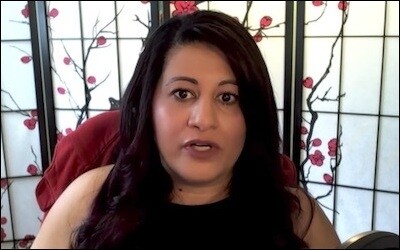Yasmine Mohammed |
Ex-Muslim Yasmine Mohammed, a Canadian citizen of Egyptian and Palestinian ancestry, just published a dramatic and heartbreaking memoir, Unveiled: How Western Liberals Empower Radical Islam. In it, she describes a childhood of horror, one in which as a girl, “you are taught to be ashamed of everything you do, everything you are.”
Daily beating, strangling, slapping, hair pulling, death threats, and domestic servitude are normalized, as is the most extreme verbal abuse, mainly from her mother: “I pissed you out,” she said. “You are my urine...You are a turd that I should have flushed...You are nothing.”
Yasmine Mohammed’s childhood reads like a page taken from my book, Woman’s Inhumanity to Woman, a book that major feminist leaders in the West cautioned me not to publish lest the “men use it against us.”
“Quite often, unfortunately, in misogynistic societies, mothers are vicious to their daughters.” |
But Yasmine understands:
“Quite often, unfortunately, in misogynistic societies, mothers are vicious to their daughters. Exerting power over their (female) children is the only domain where it is acceptable.”
Yasmine is taught to bow to her mother every morning, to literally kiss her mother’s feet. She is sleep-deprived, forced to rise before dawn to memorize the Qur’an. Yasmine’s mother ignores the fact that her husband (Yasmine’s stepfather) is “molesting” Yasmine and participates happily in her daughter’s being beaten, hung upside down from a hook “like a dead animal” so that the soles of her feet could be whipped. Yasmine dealt with the pain inflicted by the torturous punishments by escaping her body, “disassociating” is the word currently used in psychiatry.
Like other victims of torture, and prisoners of war and combat, such extreme childhood abuse leads to Post Traumatic Stress Disorder. It is rarely valorized or viewed compassionately when the sufferer is a woman.
In Muslim societies, often the mother’s only power lies in breaking and controlling her daughters. |
Eventually, Yasmine’s mother forces her into an arranged marriage with a man – whom the mother herself covets and endlessly tries to seduce – who turns out to be an al-Qaida operative who rapes and beats her. He flees—but is ultimately jailed in Egypt as a jihadist.
If I had not read at least 50 other memoirs published mainly by Muslim and ex-Muslim women, but also by or about Sikh and Hindu tribal childhoods, all of which detail similar childhoods, I would probably view Yasmine’s tale as a one-off. However, it is a terrifying typical account of growing up in a tribal family, trapped with a mother whose only power resides in tormenting, breaking, controlling, and destroying her daughters.
For similar examples of normalized extreme child abuse, we have Ayaan Hirsi Ali’s Infidel; Sami Alrabaa’s Veiled Atrocities; Sunny Angel’s Wings; Sarbit Kaur Athwal’s Shamed, Aruna Papp’s Unworthy Creature, Jasvinder Sanghera’s Shame, Soraya Mire’s The Girl with Three Legs, and Souad’s Burned Alive.
...
In The Girl with Three Legs: A Memoir, Somali-American Muslim, Soraya Mire writes about her mother’s insistence that she be genitally mutilated and about what happened when the butchering went south. Doctors wanted to open her scar but her mother refused, thus sentencing Mire to a lifetime of pain caused by edema, inflammation around the scar, a permanent urinary tract infection...a vaginal obstruction, blood clots, and a swollen abdomen.” Her mother refused surgery: “Tell these doctors I respect their opinions but they have to show respect for our life.”
Soraya Mire |
The scar sealing her vagina was proof of Soraya’s virginity.
Then, Soraya was married off to a first cousin who happened to be a sadistic drug addict. He torture-rapes her on their wedding night. Soraya turns to her mother for help—to the woman whose values Soraya herself has internalized.
Thus, for years, Soraya herself refuses to open her scar. She finally does so.
Many abused victims, both Muslim and non-Muslim, often return to their families for help. In the West, abused women tend to marry men who abuse them. Tribal women are forced into arranged marriages in which they are routinely abused. Too many face honor violence from relatives if they step out of line even slightly.
Soraya begins to help other genitally mutilated African women. After receiving a Winnie Mandela Award for the Upliftment of African Women at the John Jay College of Criminal Justice in New York, she rushes to call...her mother! “Mother listened calmly, then said: ‘You would win all the awards and become famous but you will always be nothing to me.’”
Like Soraya, no matter how extreme the abuse, both Yasmine and Sunny continued to cling to their mothers, unable to give up the illusion of connectedness. All three return again and again to the mothers, who continue to express nothing but hate for their daughters.
Girls who have suffered such extreme abuse also have identities which are defined only as that of a daughter, sister, cousin, and wife; they would have a hard time breaking free, even to save their own lives. They do not exist, psychologically, as individuals and have been taught that they do not really deserve to live. This is what got me interested in studying the variables associated with successful escapes from honor violence.
Yasmine tried to escape when she was still a child but a politically correct Canadian judge sent her back into an abusive home despite the evidence of physical abuse. “The judge ruled that corporal punishment wasn’t against the law in Canada,” she wrote, “and due to our ‘culture,’ sometimes those punishments can be more severe than the average Canadian household.”
Western feminists have refused to stand with women such as Yasmine. |
Yasmine wonders: Had she been “white,” would the authorities have removed her and sanctioned the parents/step parents who believed in practicing child torture?
What Yasmine does not understand is why Western feminists have refused to stand with feminist dissidents such as herself. In addition, "(the Western authorities) only see the skin color or the ethnicity of the perpetrator, not the acts they commit.”
Phyllis Chesler, a Shillman-Ginsburg Fellow at the Middle East Forum, is an emerita professor of psychology and women’s studies and the author of eighteen books, including Women and Madness, Woman’s Inhumanity to Woman, An American Bride in Kabul, and A Politically Incorrect Feminist.









